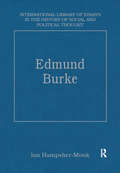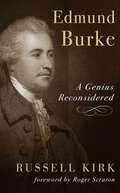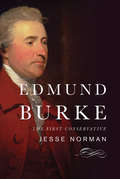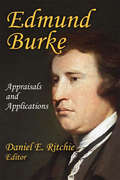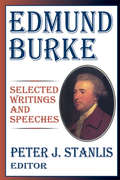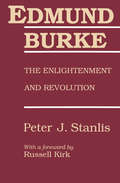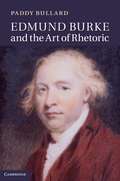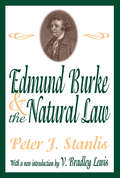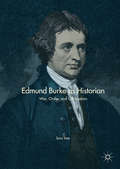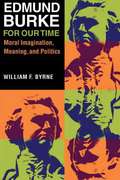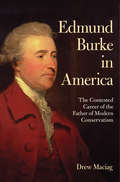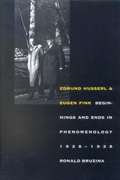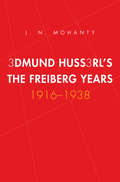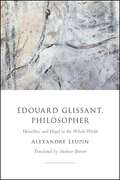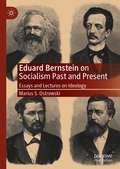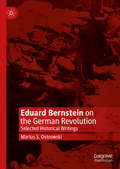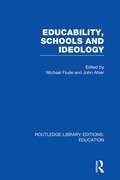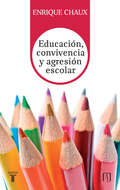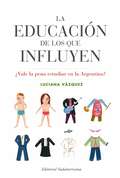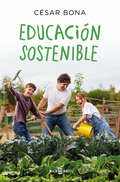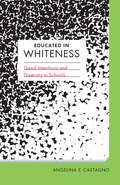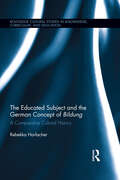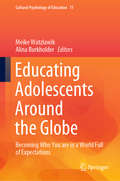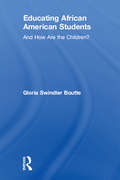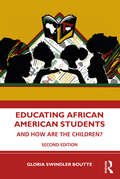- Table View
- List View
Edmund Burke (International Library of Essays in the History of Social and Political Thought)
by Iain Hampsher-MonkEdmund Burke’s iconic stance against the French Revolution and its supposed Enlightenment inspiration, has ensured his central role in debates about the nature of modernity and freedom. It has now been rendered even more complex by post-modern radicalism’s repudiation of the Enlightenment as repressive and its reason as illusionary. Not only did Burke’s own work cover a huge range - from aesthetics through history to constitutional politics and political theory - it has generated an enormous literature drawing on many disciplines, as well as continuing to be recruited in a range of contemporary polemics. In Edmund Burke, Iain Hampsher Monk presents a representative selection of articles and essays from the last 50 years of this scholarship. His introduction provides a brief biography and seeks to guide the reader through the chosen pieces as well as indicating its relationship to other and more substantial studies that form the critical heritage of this major figure.
Edmund Burke: A Genius Reconsidered
by Russell KirkIn this, the liveliest and most accessible one-volume life of Edmund Burke, Russell Kirk ingeniously combines into a living whole the private and the public Burke. He gives us a fresh assessment of the great statesman, who enjoys even greater influence today than in his own time. Russell Kirk was a leading figure in the post-World War II revival of American interest in Edmund Burke. Today, no one who takes seriously the problems of society dares remain indifferent to "the first conservative of our time of troubles." In Russell Kirk&’s words: "Burke&’s ideas interest anyone nowadays, including men bitterly dissenting from his conclusions. If conservatives would know what they defend, Burke is their touchstone; and if radicals wish to test the temper of their opposition, they should turn to Burke." Kirk lucidly unfolds Burke&’s philosophy, showing how it revealed itself in concrete historical situations during the eighteenth century and how Burke, through his philosophy, "speaks to our age." This volume makes vivid the four great struggles in the life of Burke: his efforts to reconcile England with the American colonies; his involvements in cutting down the domestic power of George III; his prosecution of Warren Hastings, the Governor General of India; and his resistance to Jacobinism, the French Revolution&’s "armed doctrine." In each of these great phases of his public life, Burke fought with passionate eloquence and relentless logic for justice and for the proper balance of order and freedom. With sure instinct born of his sympathy and understanding, Kirk gives us the incisive quotation, the illuminating highlight, the moving, all-too-human elements that bring Burke and his age to vivid life. Thanks to Russell Kirk&’s skillful evocations, Edmund Burke in these pages becomes our contemporary. "Because corruption and fanaticism assail our era as sorely as they did Burke&’s time, the resonance of Burke&’s voice still is heard amidst the howl of our winds of abstract doctrine."
Edmund Burke: The First Conservative
by Jesse NormanEdmund Burke is both the greatest and the most underrated political thinker of the past three hundred years. A brilliant 18th-century Irish philosopher and statesman, Burke was a fierce champion of human rights and the Anglo-American constitutional tradition, and a lifelong campaigner against arbitrary power. Once revered by an array of great Americans including Presidents Theodore Roosevelt and Woodrow Wilson, Burke has been almost forgotten in recent years. But as politician and political philosopher Jesse Norman argues in this penetrating biography, we cannot understand modern politics without him. As Norman reveals, Burke was often ahead of his time, anticipating the abolition of slavery and arguing for free markets, equality for Catholics in Ireland, responsible government in India, and more. He was not always popular in his own lifetime, but his ideas about power, community, and civic virtue have endured long past his death. Indeed, Burke engaged with many of the same issues politicians face today, including the rise of ideological extremism, the loss of social cohesion, the dangers of the corporate state, and the effects of revolution on societies. He offers us now a compelling critique of liberal individualism, and a vision of society based not on a self-interested agreement among individuals, but rather on an enduring covenant between generations. Burke won admirers in the American colonies for recognizing their fierce spirit of liberty and for speaking out against British oppression, but his greatest triumph was seeing through the utopian aura of the French Revolution. In repudiating that revolution, Burke laid the basis for much of the robust conservative ideology that remains with us to this day: one that is adaptable and forward-thinking, but also mindful of the debt we owe to past generations and our duty to preserve and uphold the institutions we have inherited. He is the first conservative. A rich, accessible, and provocative biography, Edmund Burke describes Burke’s life and achievements alongside his momentous legacy, showing how Burke’s analytical mind and deep capacity for empathy made him such a vital thinker#151;both for his own age, and for ours.
Edmund Burke: Appraisals and Applications (Library Of Conservative Thought Ser.)
by Daniel E. RitchieThe eighteenth century remains contemporary more than 200 years later because the fundamental questions raised then about politics in both the American and French Revolutions still speak to us. The writings of Edmund Burke on these and other political events of his time are today acknowledged as the basis of modern conservative thought. This volume brings together an outstanding collection of interpretative essays on Burke, and serves as a basic introduction to this seminal thinker.A member of the British Parliament from 1766 to 1794, Edmund Burke had sympathized with the American War of Independence and argued for reform of British policy toward Ireland and India, but he surprised many of his friends by his early, vehement opposition to the French Revolution. This volume brings together assessments of these and other statements by Burke by contemporaries such as Samuel Taylor Coleridge and William Hazlitt, along with essays by Irving Babbitt and Russell Kirk, who established his significance for twentieth-century conservatism.This is a collection of the best, previously published interpretive essays on Burke. It will be of interest to all those interested in the philosophical roots of conservatism, in the history of political thought, in revolution, and in modern political ideologies.
Edmund Burke: Essential Works and Speeches (The Library of Conservative Thought #Vol. 1)
by Peter StanlisIn this unique book, Peter J. Stanlis, the leading Burke scholar in America, has collected all the most important works and speeches of Edmund Burke (1729-1797), British statesman, political philosopher, and founder of modern conservative thought and, with due care to preserve the beauty of Burke's prose, edited them down to their essentials."The main purpose of these selections," Stanlis explains, "is to present extensive and in the main unbroken samples of Burke's most representative thought in his most characteristic style, on a great variety of subjects."In this major effort you can find--to name only a few topics covered--Burke's defense of ordered liberty, his advocacy of secure property rights, his love of Christianity and Europe's moral tradition, and his impassioned jeremiad against the orgy of destruction that the French Revolution became. Stanlis's general introduction gives important insight into Burke's early life, education, professional training, literary and political career, prose style, political philosophy, and more. In addition, each selection is preceded by a headnote that clarifies the selections in their historical context and includes a brief analytical interpretation. A chronology highlights important dates in Burke's life and career.In its compactness and comprehensiveness, this volume is the quintessential Burke reader. It will be of interest to historians, political scientists, and students of literature and intellectual history.
Edmund Burke: The Enlightenment and Revolution (The Library of Conservative Thought #Vol. 1)
by Peter J. StanlisTwo centuries after Edmund Burke published his Reflections on the Revolution in France, his name and reputation stand alongside Locke, Montesquieu, and Hume - the other still-cited grand political thinkers of the eighteenth century. For those great nations that have fallen into what Burke called "the antagonist world of madness, discord, vice, confusion and unavailing sorrow," the work of Burke supplies that sense of order, justice and freedom the present age seems to require.This volume by Peter Stanlis has grown out of almost four decades of studying Burke. Today, Professor Stanlis is called by Russell Kirk "the leading American authority on the political thought of the great conservative reformer." The book is divided into three categories: Burke on law and politics; Burke's criticism of Enlightenment rationalism and sensibility; and Burke's theory of revolution and critique of the English revolution of 1688.Stanlis' reasons' for linking Burke to the English Revolution rather than the later, and admittedly more decisive American and French Revolutions of his own time, is that for Burke, that earlier event was the normative pivot for judging how to make important changes in civil society. Indeed, even in his writings on the contemporary revolutions of his time,. Stanlis reminds us that Burke interpreted revolutionary events in France and Americas through the prism of the bloodless Revolution of 1688.
Edmund Burke and the Art of Rhetoric
by Paddy BullardEdmund Burke ranks among the most accomplished orators ever to debate in the British Parliament. But often his eloquence has been seen to compromise his achievements as a political thinker. In the first full-length account of Burke's rhetoric, Bullard argues that Burke's ideas about civil society, and particularly about the process of political deliberation, are, for better or worse, shaped by the expressiveness of his language. Above all, Burke's eloquence is designed to express ethos or character. This rhetorical imperative is itself informed by Burke's argument that the competency of every political system can be judged by the ethical knowledge that the governors have of both the people that they govern and of themselves. Bullard finds the intellectual roots of Burke's 'rhetoric of character' in early modern moral and aesthetic philosophy, and traces its development through Burke's parliamentary career to its culmination in his masterpiece, Reflections on the Revolution in France.
Edmund Burke and the Natural Law (The Library of Conservative Thought)
by Peter StanlisToday the idea of natural law as the basic ingredient in moral, legal, and political thought presents a challenge not faced for almost two hundred years. On the surface, there would appear to be little room in the contemporary world for a widespread belief in natural law. The basic philosophies of the opposition--the rationalism of the philosophes, the utilitarianism of Bentham, the materialism of Marx--appear to have made prior philosophies irrelevant. Yet these newer philosophies themselves have been overtaken by disillusionment born of conflicts between "might" and "right." Many thoughtful people who were loyal to secular belief have become dissatisfied with the lack of normative principles and have turned once more to natural law.This first book-length study of Edmund Burke and his philosophy, originally published in 1958, explores this intellectual giant's relationship to, and belief in, the natural law. It has long been thought that Edmund Burke was an enemy of the natural law, and was a proponent of conservative utilitarianism. Peter J. Stanlis shows that, on the contrary, Burke was one of the most eloquent and profound defenders of natural law morality and politics in Western civilization. A philosopher in the classical tradition of Aristotle and Cicero, and in the Scholastic tradition of Aquinas, Burke appealed to natural law in the political problems he encountered in American, Irish, Indian, and British affairs, and in reaction to the French Revolution.This book is as relevant today as it was when it was first published, and will be mandatory reading for students of philosophy, political science, law, and history.
Edmund Burke as Historian: War, Order And Civilisation
by Sora SatoThis book provides a comprehensive survey of Edmund Burke's historical thought, a neglected area of both Burke scholarship and historiography. Ranging from Burke's general conception of history to his accounts of English, European, American, Irish and Asian-Muslim history, this book offers much-needed depth and context to his political life. Sora Sato illuminates Burke's ideas on civilisation and world order with careful analysis of both his well-known historical concepts, such as the ancient constitution of England and the spirit of chivalry, as well as his lesser-known opinions on war and the military. Written with clarity and precision, this book is an invaluable reference for scholars of Burke, early modern European history and political philosophy.
Edmund Burke for Our Time: Moral Imagination, Meaning, and Politics
by William ByrneThis highly readable book offers a contemporary interpretation of the political thought of Edmund Burke, drawing on his experiences to illuminate and address fundamental questions of politics and society that are of particular interest today. For Burke, oneÆs imaginative context provides meaning and is central to judgment and behavior. Many of BurkeÆs ideas can be brought together around his concept of the \u201cmoral imagination,\u201d which has received little systematic treatment in the context of BurkeÆs own experience. In Edmund Burke for Our Time, Byrne asserts that BurkeÆs politics is reflective of unique and sophisticated ideas about how people think and learn and about determinants of political behavior. BurkeÆs thought is shown to offer much of contemporary value regarding the sources of order and meaning and the potential for a modern crisis if those sources are weakened or obscured. In addition to providing a re-interpretation of BurkeÆs response to a number of historical situations—including problems of colonial or imperial policy with regard to India, Ireland, and America—Byrne looks at the relationship between emotion and reason, and the role of culture in shaping political, social, and personal behaviors.To assist even readers with limited knowledge of Burke, the book includes biographical and historical information to provide needed context. ByrneÆs important study will appeal to political philosophers, literature scholars, and those interested in addressing problems of politics and society in this late-modern age.
Edmund Burke In America
by Drew MaciagThe statesman and political philosopher Edmund Burke (1729-1797) is a touchstone for modern conservatism in the United States, and his name and his writings have been invoked by figures ranging from the arch Federalist George Cabot to the twentieth-century political philosopher Leo Strauss. But Burke's legacy has neither been consistently associated with conservative thought nor has the richness and subtlety of his political vision been fully appreciated by either his American admirers or detractors. In Edmund Burke in America, Drew Maciag traces Burke's reception and reputation in the United States, from the contest of ideas between Burke and Thomas Paine in the Revolutionary period, to the Progressive Era (when Republicans and Democrats alike invoked Burke's wisdom), to his apotheosis within the modern conservative movement. Throughout, Maciag is sensitive to the relationship between American opinions about Burke and the changing circumstances of American life. The dynamic tension between conservative and liberal attitudes in American society surfaced in debates over the French Revolution, Jacksonian democracy, Gilded Age values, Progressive reform, Cold War anticommunism, and post-1960s liberalism. The post-World War II rediscovery of Burke by New Conservatives and their adoption of him as the "father of conservatism" provided an intellectual foundation for the conservative ascendancy of the late twentieth century. Highlighting the Burkean influence on such influential writers as George Bancroft, E. L. Godkin, and Russell Kirk, Maciag also explores the underappreciated impact of Burke's thought on four U. S. presidents: John Adams and John Quincy Adams, Theodore Roosevelt, and Woodrow Wilson. Through close and keen readings of political speeches, public lectures, and works of history and political theory and commentary, Maciag offers a sweeping account of the American political scene over two centuries.
Edmund Husserl and Eugen Fink: Beginnings and Ends in Phenomenology, 1928-1938
by Ronald BruzinaEugen Fink was Edmund Husserl's research assistant during the last decade of the renowned phenomenologist's life, a period in which Husserl's philosophical ideas were radically recast. In this landmark book, Ronald Bruzina shows that Fink was actually a collaborator with Husserl, contributing indispensable elements to their common enterprise. Drawing on hundreds of hitherto unknown notes and drafts by Fink, Bruzina highlights the scope and depth of his theories and critiques. He places these philosophical formulations in their historical setting, organizes them around such key themes as the world, time, life, and the concept and methodological place of the "meontic," and demonstrates that they were a pivotal impetus for the renewing of "regress to the origins" in transcendental-constitutive phenomenology.
Edmund Husserl's Freiburg Years 1916-1938
by J. N. MohantyIn his award-winning book The Philosophy of Edmund Husserl: A Historical Development, J.N. Mohanty charted Husserl's philosophical development from the young man's earliest studies--informed by his work as a mathematician--to the publication of his Ideas in 1913. In this welcome new volume, the author takes up the final decades of Husserl's life, addressing the work of his Freiburg period, from 1916 until his death in 1938. As in his earlier work, Mohanty here offers close readings of Husserl's main texts accompanied by accurate summaries, informative commentaries, and original analyses. This book, along with its companion volume, completes the most up-to-date, well-informed, and comprehensive account ever written on Husserl's phenomenological philosophy and its development.
Édouard Glissant, Philosopher: Heraclitus and Hegel in the Whole-World
by Alexandre LeupinOne of the greatest writers of the late twentieth century, Édouard Glissant's body of work covers multiple genres and addresses many cogent contemporary problems, such as borders, multiculturalism, postcolonial and decolonial studies, and global humanities. Édouard Glissant, Philosopher is the first study that maps out this writer's entire work in relation to philosophy. Glissant is reputed to be a "difficult writer;" however, Alexandre Leupin demonstrates the clarity and coherence of his thinking. Glissant's rereading of Western philosophy entirely remaps its age-old questions and offers answers that have never been proposed. In doing so, Glissant offers a new way to think about questions that are at the forefront of Global Humanities today: identity, race, communities, diasporas, slavery, nation-states and nationalism, aesthetics, ethics, and the place and function of poetry and art in a globalized world. This book will elucidate Glissant's theoretical writings, not only in England and in America but also in the anglophone Caribbean, Africa, and India.
Eduard Bernstein on Socialism Past and Present: Essays and Lectures on Ideology
by Marius S. OstrowskiThis book presents six major texts and selected shorter writings by the social-democratic thinker and politician Eduard Bernstein, translated into English for the first time: Socialism Past and Present; The Social Doctrine of Anarchism; Social Liberalism or Collectivism?; How is Scientific Socialism Possible?; What is Socialism?; The Socialisation of Enterprises; and articles from the periodicals Neue Zeit and Sozialistische Monatshefte alongside several unpublished manuscripts. Written over the period 1893 to 1931, these works focus on socialism as an ideology, and trace debates about ethics, social science, and class struggle that preoccupied the early-20th-century socialist movement. Bernstein carefully demarcates the boundaries between socialism and its ideological rivals, contrasting its communitarian aspirations with individualistic liberalism and anarchism, and its adherence to democratic methods with the totalitarian violence of communism and fascism. He revisits the intellectual canon of socialist thought, recentring contributions by Ferdinand Lassalle, Karl Rodbertus, and other neglected figures alongside those of Karl Marx and Friedrich Engels. Urging socialists to seize the opportunities afforded by their growing political representation, Bernstein addresses the strategies needed to achieve progressive policy reforms, including the prospects for realising socialism with the foundation of the Weimar Republic. 'In this illuminating collection, Marius Ostrowski brings together several essays by Eduard Bernstein, spanning a forty-year period of activity and addressing the question of “what is socialism”. At a time of renewed reflection on the foundation and value of social democracy, engaging with the thought of one of its founding fathers will be immeasurably valuable for both supporters and critics.' —Professor Lea Ypi, London School of Economics, UK 'During his long life, Eduard Bernstein made a contribution of great significance to both the theoretical and political development of the left, emerging as a founding figure of European social democracy. In this splendid volume, Marius Ostrowski presents Bernstein’s writing in its full richness and complexity, bringing together his lucid translations into English of some of the major theoretical works published by Bernstein during the years of the Weimar Republic. This book makes a valuable contribution to our understanding of the development of the socialist tradition during a period of great political turmoil, and gives us a three-dimensional understanding of Bernstein’s contributions to socialism and social democracy.' — Dr Martin O’Neill, University of York, UK
Eduard Bernstein on the German Revolution: Selected Historical Writings
by Marius S. OstrowskiThis book presents two major texts and selected shorter writings by the social-democratic thinker and politician Eduard Bernstein, translated into English in full for the first time: The German Revolution: A History of the Emergence and First Working Period of the German Republic; How A Revolution Perished; and articles from Vorwärts and other socialist periodicals. Written in the aftermath of the 1918 German Revolution and the end of WWI, they address the overthrow of autocratic rule in Germany, and provide a live chronicle and retrospective assessment of the Weimar Republic’s foundation. Bernstein gives a detailed chronology of the German Revolution and its intellectual, economic, and political context, and offers a historical analogy in his account of the 1848 French Revolution, which differs in key respects from that of Karl Marx in The Eighteenth Brumaire of Louis Napoleon. Drawing on his own experience of the events he describes, he revisits the socialist debate over ‘reform or revolution’ that he himself had provoked at the turn of the 20th century, and consciously seeks to wrest ownership of the Revolution’s legacy away from the Spartacist and communist left. In these works, Bernstein exhorts social democrats to rally behind the nascent Republic and resist the siren-calls of its militant opponents on radical left and right, and he engages with themes of party unity, political violence, democracy, and the role of ideology that have echoed through left theory and strategy ever since.
Educability, Schools and Ideology (Routledge Library Editions: Education)
by Michael Flude John AhierThe sociology of education has been at the forefront of new developments in sociological theory. This book examines and criticizes a number of these new developments and discusses some empirical work on issues of current concern. One of the few books that integrates radical and critical sociology into the field of education, it deals with the resultant difficulties. The topics covered include cultural deprivation, ideologies in education, classrooms, the teaching profession and the history of women’s education.
Educación, convivencia y agresión escolar
by Enrique ChauxUna investigación sobre problemas que afectan a los jovenes.
La educación de los que influyen: ¿Vale la pena estudiar en la Argentina?
by Luciana VazquezUna reflexión acerca de la educación formal en la Argentina a partir deentrevistas a treinta y cinco empresarios, intelectuales, economistas,políticos, hombres de la Iglesia y artistas que contaron sus historiasformativas y respondieron sobre la educación que planean para su hijos. ¿Cómo fue la educación formal de los que influyen y mandan en todo? ¿Estan importante decidir qué tipo de educación recibirán nuestros hijos? ¿Serán los abanderados los líderes del futuro?Éstas son algunas de las preguntas fundamentales que se plantea LucianaVázquez. Después del largo reinado del coeficiente intelectual y laexcelencia académica, después de la hegemonía de la inteligenciaemocional y de la inteligencia social de Daniel Goleman, después deldesembarco del educando-a-los-niños-para-hacer-dinero de Robert Kiyosakiy ahora que la formación en valores parece ganar adeptos, La educaciónde los que influyen se pregunta dónde pusieron el foco aquellos quelograron el reconocimiento público.Parece un libro de entrevistas pero es más bien un ensayo sobre lajusticia y la virtud, sobre el destino y la vocación. La gran preguntaes: ¿Vale la pena estudiar en la Argentina? Y las respuestas queencuentra Luciana Vázquez son tan paradójicas como inesperadas.
Educación sostenible
by César BonaPodríamos preguntarnos si este es el mundo que vamos a dejar a las futuras generaciones, pero este no es un libro sobre lo que va a pasar en el futuro, es un libro sobre el presente. La educación es la pieza clave para cuestiones tan actuales como la sostenibilidad o el cambio climático. Invitemos a niños y niñas a que sean los principales protagonistas de un cambio en el cual nosotros, adultos, tenemos que ser los primeros en creer. Así que demos el paso y sirvamos de ejemplo. Preguntémonos: «¿Qué puedo hacer yo?» y, sobre todo, «¿Qué podemos hacer juntos?» En casa, en la escuela, de forma individual y en grandes equipos. Pequeños gestos y acciones del día a día han de provocar ese cambio. Hemos de actuar, no por miedo a qué pasará si no lo hacemos sino porque con nuestras acciones estaremos respetando el lugar donde vivimos, nuestra casa. César Bona (Ainzón, Zaragoza, 1972). Maestro y escritor. Licenciado en Filología Inglesa y Diplomado en Magisterio en Lengua Extranjera por la Universidad de Zaragoza. «Las puertas de las escuelas han de estar abiertas, no solo para que entren los niños y las niñas sino para que sus ideas salgan y transformen el mundo». Pensamientos como este son los que le llevaron al Congreso Mundial por los Derechos de la Infancia, en el XXV Aniversario de la Convención de los Derechos del Niño. Por sus múltiples proyectos vinculados a la participación infantil recibió el Premio Magister de Honor por la Plataforma de la Escuela Pública, el Premio Crearte del Ministerio de Cultura en dos ocasiones por estimular la creatividad, así como también la Cruz José de Calasanz, máxima distinción en la educación aragonesa o el Premio Medio Ambiente Aragón 2013. Además, obtuvo la Mención de Honor en el International Children Film Festival of India, por la película de cine mudo The importance of being an Applewhite, que consiguió unir a dos familias que no se hablaban. Y tras dieciséis años de trayectoria, fue nominado como uno de los 50 mejores maestros del mundo según el Global Teacher Prize (2014). Ha formado parte del jurado de los premios Princesa de Asturias, en la categoría de Comunicación y Humanidades, en 2017, 2018 y 2019. Entresus libros destacan La nueva educación (2015), Las escuelas que cambian el mundo (2016), La emoción de aprender (2018) y Humanizar la educación (2021), libros que ahora sirven de referencia en muchas universidades. Además, para niños ha escrito Derechos y deberes de la Infancia (2019), El asombroso mundo de Bernardo (2018) y una adaptación del Quijote (2017).
Educated in Whiteness: Good Intentions and Diversity in Schools
by Angelina E. CastagnoEducators across the nation are engaged in well-meaning efforts to address diversity in schools given the current context of NCLB, Race to the Top, and the associated pressures of standardization and accountability. Through rich ethnographic accounts of teachers in two demographically different secondary schools in the same urban district, Angelina E. Castagno investigates how whiteness operates in ways that thwart (and sometimes co-opt) even the best intentions and common sense—thus resulting in educational policies and practices that reinforce the status quo and protect whiteness rather than working toward greater equity.Whereas most discussions of the education of diverse students focus on the students and families themselves, Educated in Whiteness highlights the structural and ideological mechanisms of whiteness. In schools, whiteness remains dominant by strengthening and justifying the status quo while simultaneously preserving a veneer of neutrality, equality, and compassion. Framed by critical race theory and whiteness studies, this book employs concepts like interest convergence, a critique of liberalism, and the possessive investment in whiteness to better understand diversity-related educational policy and practice.Although in theory most diversity-related educational policies and practices are intended to bring about greater equity, too often in practice they actually maintain, legitimate, and so perpetuate whiteness. Castagno not only sheds light on this disconnect between the promises and practices of diversity-related initiatives but also provides insight into why the disconnect persists.
The Educated Subject and the German Concept of Bildung: A Comparative Cultural History (Routledge Cultural Studies in Knowledge, Curriculum, and Education #2)
by Rebekka HorlacherGerman education plays a huge role in the development of education sciences and modern universities internationally. It is influenced by the educational concept of Bildung, which defines Germany ‘s theoretical and curricular ventures. This concept is famously untranslatable into other languages and is often misinterpreted as education, instruction, training, upbringing and other terms which don’t encompass its cultural ambitions. Despite this hurdle, Bildung is now being recognized in current discussions of education issues such as standardization, teaching to the test, evidence-based policy and high stakes testing. This volume clears up the confusion and misunderstandings surrounding Bildung by examining the origins of the concept and how it has been applied throughout history. It paves the way for educators to fully understand and benefit from this model and all it has to offer.
Educating Adolescents Around the Globe: Becoming Who You Are in a World Full of Expectations (Cultural Psychology of Education #11)
by Meike Watzlawik Alina BurkholderBy traveling to different parts of the world, this book provides a multidisciplinary perspective on the current state of adolescent education and demonstrates how education systems are formed by and closely tied to culture. After establishing a theoretical background, the book delves into the particulars of adolescent education and its associated challenges in six countries (India, Kenya, Germany, Brazil, Japan, and Denmark). In tandem with the discussion of institutions, the stories of those who are all too often underserved or left behind are told. Despite the diversity of each education system, the investigation reveals several unifying themes that transcend the specific contexts. The lessons from each example are woven together to demonstrate how the individualized needs of students can best be met, in a vision for the future of educating adolescents."
Educating African American Students: And How Are the Children?
by Gloria Swindler BoutteFocused on preparing educators to teach African American students, this straightforward and teacher-friendly text features a careful balance of published scholarship, a framework for culturally relevant and critical pedagogy, research-based case studies of model teachers, and tested culturally relevant practical strategies and actionable steps teachers can adopt. Its premise is that teachers who understand Black culture as an asset rather than a liability and utilize teaching techniques that have been shown to work can and do have specific positive impacts on the educational experiences of African American children.
Educating African American Students: And How Are the Children?
by Gloria Swindler BoutteThis straightforward and reader-friendly text provides strategies for P-12 educators who are interested in ensuring the cultural and academic excellence of African American students. It presents a careful balance of published scholarship, a framework for culturally relevant teaching, and research-based cases of teachers who excel at teaching Black children. Examples from multi-ethnic teachers across P-12 grades and content areas (e.g., ELA, science, mathematics, social studies, arts) are presented so that others can extrapolate in their respective educational settings. This book explains Black culture, anti-Black racism, African Diaspora Literacy, African American Language, and pro-Black and actionable steps that educators can adopt and implement. Examples of culturally relevant family and community involvement are provided. As with the previous edition, readers will appreciate a multitude of resources. After reading this book, educators will view educating African American students as exhilarating and rewarding and Black students will flourish.
